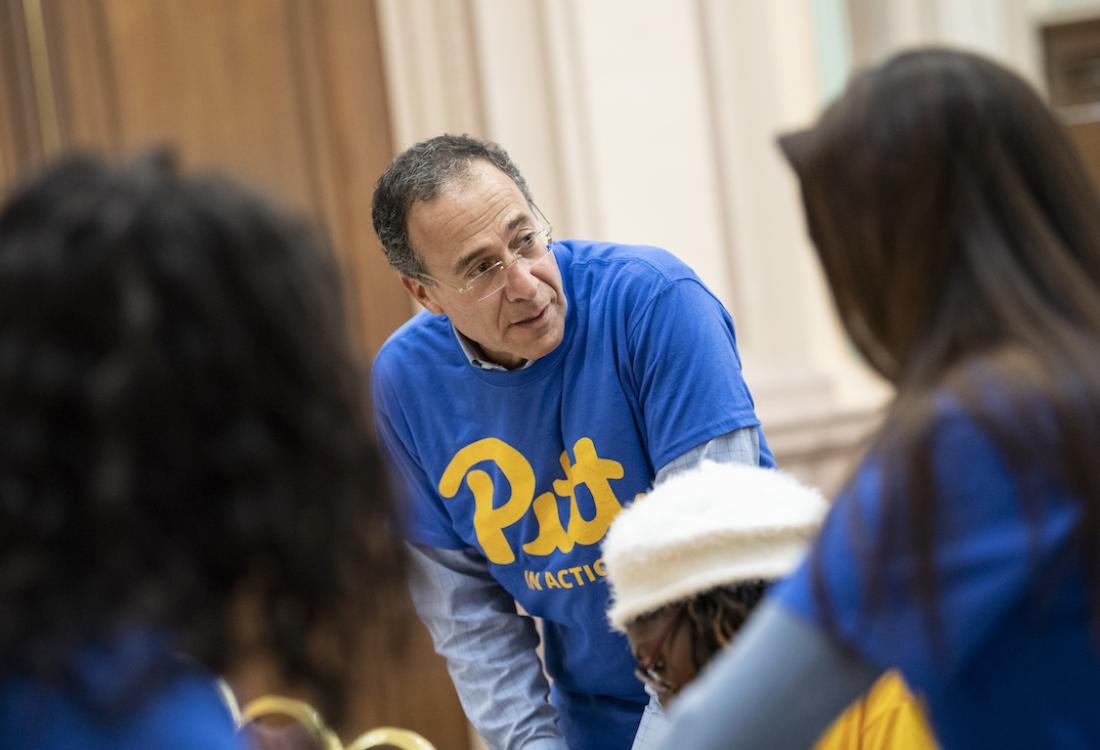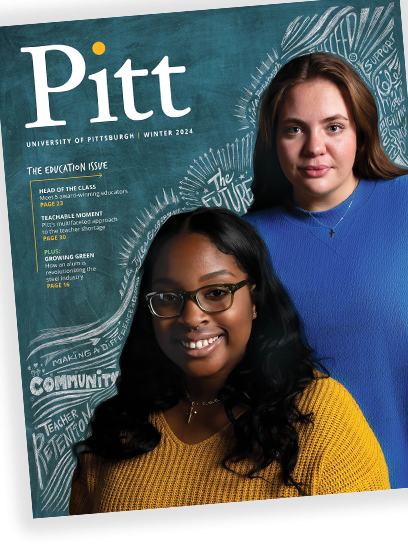
Paul Supowitz’s family was in the shoe business.
It all started in the early 1900s with a single cart on Fifth Avenue in Pittsburgh, but as the steel industry grew, so, too, did the business. Soon, S&S Shoes occupied multiple storefronts in bustling towns along the Allegheny and Monongahela rivers, selling everything from steel-toed boots to Mary Janes.
For most of his teenage years, Supowitz dragged himself out of bed on Saturday mornings to work in the warehouse on the city’s South Side or at one of the locations in nearby Homestead. But, by the time he graduated from Pitt’s School of Law in 1989, S&S was no more. The steel industry collapse and resulting population tumble had forced the business into bankruptcy.
Supowitz remembers the decline well. Within the span of a decade, the flourishing Western Pennsylvania of his youth was nearly unrecognizable. With perhaps one exception — the University of Pittsburgh.
Pitt stood as a kind of beacon for the demoralized region, promising better days ahead. It’s the reason Supowitz, after an eight-year stint in environmental law, eagerly returned to the University, ready to play his part in both the city’s history and its future.
“I feel very fortunate to have been at Pitt for these 27 years and to be a part of the renaissance of Pittsburgh,” Supowitz says. “To be at a place that’s had such an outsized role in that change has always been a big motivator for me.”
Supowitz retired from Pitt on Aug. 23 having played an outsized part in many of the University’s most impactful developments in the past quarter century.
“When I think of the phrase ‘It’s Possible at Pitt,’ Paul Supowitz is one of the first people who comes to mind,” says Chancellor Joan Gabel. “During his 20-plus-year career at the University of Pittsburgh, Paul has epitomized Pitt’s spirit of possibility, from his leadership in preserving and strengthening the University’s relationship with the commonwealth to his contributions to several strategic initiatives on behalf of this office. Personally, I’m incredibly grateful for his invaluable support during my first year as chancellor, and I wish him all the best in retirement.”
Supowitz began his Pitt career in 1997 as an associate general counsel tasked with helping to secure approvals for the Petersen Events Center on Allequippa Street and the Bouquet Gardens apartment complex near Posvar Hall. It was not exactly a plush assignment.
“At that time, our relationships with the neighbors were not good,” Supowitz says. “We really dug in and turned that around. We worked hard not just to get those projects off the ground but also to revitalize the relationships with the neighbors.”
One person who took notice was Renny Clark, then the vice chancellor for community and governmental relations. He remembers Supowitz being both methodical and even-tempered — a product of his legal education — and adept at fostering relationships with crucial partners, including the Oakland Business Improvement District and the Oakland Planning and Development Corporation.
Clark and then-Chancellor Mark Nordenberg soon agreed that Supowitz could better serve the University by nurturing and reviving those relationships. He joined Clark’s office in 2002 as associate vice chancellor for commonwealth, city and county relations. In 2006, when Clark left to be Nordenberg’s chief of staff, Supowitz became vice chancellor for community and government relations, leading Pitt’s interactions with all levels of government.
Many of Pitt’s signature developments, such as Schenley Plaza, the Petersen Sports Complex (the 12-acre site for baseball, softball and soccer), the refurbishment of Bigelow Boulevard and the creation of the Community Engagement Centers (CECs) came to fruition under Supowitz, proving Clark and Nordenberg’s hunch correct. Supowitz also led the University through what Nordenberg calls “some of our most historically demanding times in terms of commonwealth relations,” including a protracted state funding dispute.
“What everyone who has worked with Paul knows is that he is very smart and completely trustworthy,” says Nordenberg. “Depending upon the circumstances, he has the ability to be either a forceful advocate or a respectful listener, complementary abilities that are indispensable in governmental relations work.”
Supowitz wasn’t just a force on campus, says Kevin Washo, senior vice chancellor for university relations and the chancellor's chief of staff. He’s also left his mark on the surrounding community, serving on multiple boards, including the Oakland Task Force and Pittsburgh Parks Conservancy.
“It’s not often you get to make an impact both internally and externally,” Washo says. “Paul was in a unique position where he was able to do amazing work for Pitt and with the boards he served on. And he did it with integrity.”
Clark believes Supowitz’s success, on campus and beyond, had as much to do with what he did as what he never did: He never got frustrated. He never ignored a call. And he never let a misconception about Pitt go uncorrected.
Lina Dostilio, the vice chancellor of engagement and community affairs (whose hiring Supowitz calls the best thing he did for the University), would add one more never to Clark’s list: Supowitz never thought any job or any person was beneath him.
“He led in a way that encouraged transparency and warm relationships,” she says. “When Paul led a team, you knew that team’s work would be really effective.”
One of her most enduring memories of working with Supowitz, and maybe the one most emblematic of his character, happened on a summer day in Pittsburgh’s Homewood neighborhood. It was 2017, the early days of Pitt’s community engagement initiative, when the now-thriving CEC was an idea but not yet a reality. The University invited residents and key partners in the Homewood community to a picnic to celebrate their collaboration.
As the afternoon wore on and the temperature crept up, they began to run out of refreshments. It was Supowitz who took multiple trips to the drugstore down the street to buy cases of water and lug them back to the celebration, ensuring no one went thirsty.
“He is the epitome of a servant leader,” Dostilio says. “I can’t think of anyone more invested in Pitt being a better version of itself.”



